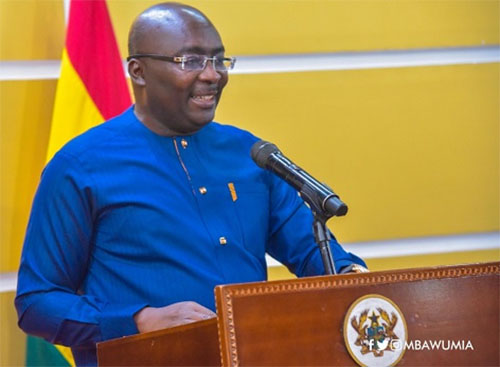Dr. Mahamudu Bawumia
GHANA’S PLANS to overhaul its regulatory system and establish a one-stop shop for investors as part of broader efforts to boost FDI, are explored in a new Covid-19 Response Report (CRR) produced by Oxford Business Group (OBG) in partnership with the Ghana Investment Promotion Centre (GIPC).
The CRR charts the steps taken to enhance Ghana’s business environment by promoting transparency and accountability, which include the launch of an online delivery tracker documenting progress of the government’s infrastructure projects.
Other topical issues examined include the national push to improve food security and self-sufficiency, which have taken on added importance since the arrival of the virus and will be driven forward through large-scale agricultural modernization efforts.
The Covid-19 Alleviation and Revitalization of Enterprises Support (CARES) programme, an expansive GH¢100 billion economic response and development plan, is another key focus of the report. Aspects of this wide-ranging, two-phased initiative analyzed includes the country’s plans to bolster the healthcare system, boost support for businesses, introduce a national unemployment insurance scheme and provide retraining initiatives.
Ghana’s infrastructure projects and the opportunities they present for investment are also given extensive coverage. Subscribers will find details of the many major initiatives in the pipeline, led by the six-phase Railway Master Plan, road developments, bridges, hospitals and homes.
The CRR includes interviews with high-profile personalities from across the public and private sectors, including Mahamudu Bawumia, the Vice-President of Ghana.
In an interview, Dr Bawumia shares his thoughts on the economic sectors most in need of investment, the part that digital solutions will play in transforming Ghana and how the country can leverage its location as the headquarters of the African Continental Free Trade Area Secretariat.
“We believe our country has the potential to be a hub in many areas such as petrochemicals, financial services, education and digital services,” he told OBG. “We have achieved a lot in recent years regarding digital services in particular. We are now at a stage where we have all infrastructures in place and will be connecting it in 2021 to achieve a fully interconnected system across the country.”
Yofi Grant, the CEO of GIPC, added that “with the African Continental Free Trade Area Agreement set to commence in January 2021, our strategy will be geared towards impact investment and targeting investors in sectors that will give Ghana the competitive advantage needed in the Fourth Industrial Revolution.”
Karine Loehman, OBG’s Managing Director for Africa, said that while fallout from the pandemic had weighed heavily on Ghana, exacerbated by declining oil prices and significant global trade reductions, a survey of C-suite business executives in the country conducted by OBG in September and featured in the CRR suggested companies were resuming their operations and upbeat about the future.
“With a combined 63% of companies already operating at or above 60% capacity, 79% of business leaders expected their company to be operating above those levels by January 2021,” she said, adding, “Company revenue forecasts for the next 12 months are also encouraging, with 40% of respondents expecting returns to be steady and 25% indicating higher or much higher revenues.”

